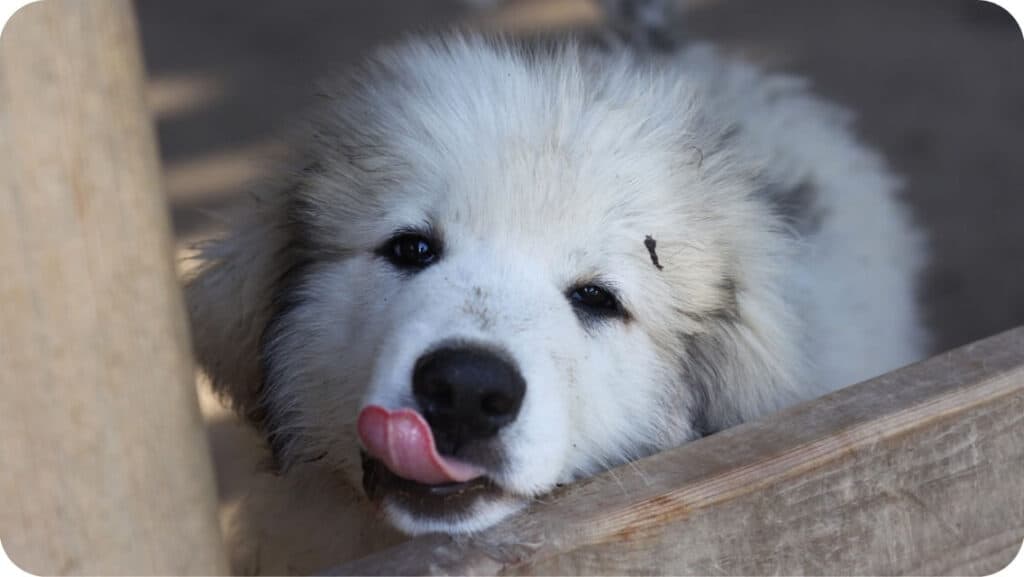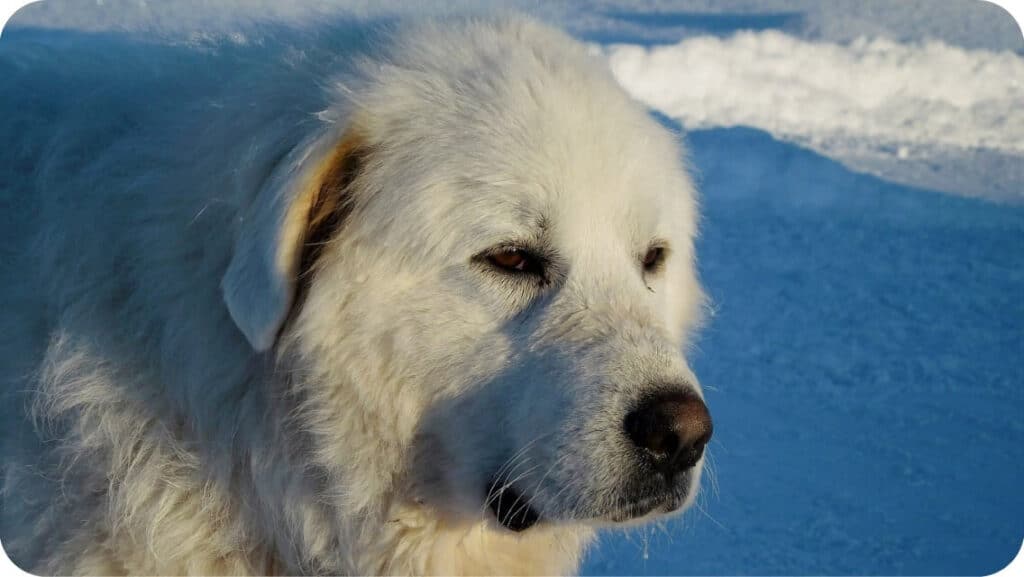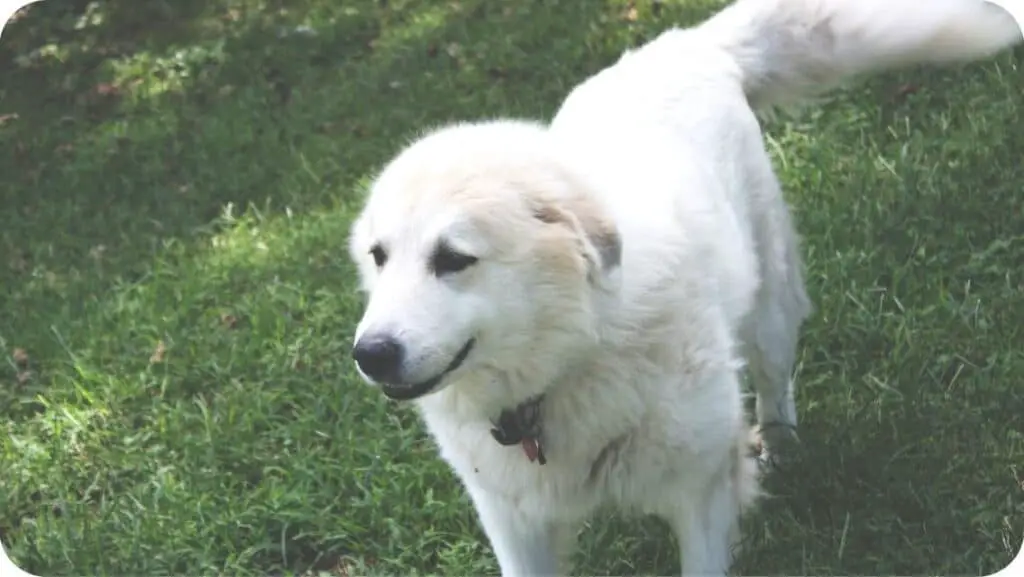In a few forums, I discovered that a frequently asked question about the Great Pyrenees is why they pant so much. As being a dog lover myself, I decided to do research on it. This is what I found.
Why does your Great Pyrenees pants so much? Heavy panting in a Great Pyrenees dog can occur for a few different reasons which include heatstroke, poisoning, overweight, heart problems, respiratory disorder, injury, stress, lack of blood calcium etc. In these cases, the best possible solution is to take your fur baby to a good vet without wasting much time.
I have found 11 possible reasons why a Great Pyrenees might pant excessively. Along with that, I have also provided some possible solutions that you can follow if your Great Pyrenees is having a heatstroke or other health problems. Keep reading to know them yourself.

Is Your Great Pyrenees Panting Too Much?
Panting is a normal trait of the Great Pyrenees. So, do not get frightened immediately.
However, if your Great Pyrenees is panting too much that might or might not be a sign of concern. It all depends on what your Great Pyrenees is going through. Read below to know what the possible causes might be.
11 Common Reasons: Why Do Great Pyrenees Pant So Much?
Although you might simply assume that the reason behind your dog panting is because of overheat or them being exhausted. However, the reason might be much more complex than that. Here are some reasons why your Great Pyrenees might be panting so much.
#1 Does Your Great Pyrenees Pant For Her Overweight?
Among many possibilities, being overweight can be one of the possibilities why your Great Pyrenees pants so much.
Overweight itself can be a cause of many other health problems. Such as- it causes them to be hot, stressed, makes them suffer from many diseases and heart problems etc. Overweight is the root for many other health factors that may lead your dog to pant excessively.
According to experts, on average, Great Pyrenees should weigh between 100 and 160 pounds for males and 85 to 115 pounds for females. So, if your dog is overweight, this might be the case.
#2 Does Your Great Pyrenees Suffer From Heatstroke or Poisoning?
Panting is a common occurrence in happy, healthy dogs. It assists dogs in cooling down because they are unable to sweat like humans.
The Great Pyrenees are big, thick-coated dogs. Even in a 68-degree house, these dogs will quickly get overheated which will cause them to pant.
However, in most cases, it is easy to identify normal panting from excessive panting. So, this should not be taken lightly as it may require a serious medical emergency.
Excessive panting, glassy eyes, weakness, a racing heart, drooling, seizures, vomiting, and diarrhea are all signs of heatstroke. Besides, it is also possible that your dog has consumed anything toxic.
Identify if your Great Pyrenees is suffering from any of the symptoms before taking any further steps.
#3 Does Your Great Pyrenees Deal with Injury and Pain?
When dogs are in distress, they are unable to communicate with us using words. As a result, we must be aware of what to look for. The reason behind your Great Pyrenees suffering from heavy panting can be an indication of her being nauseous, injured or in pain.
Other symptoms of pain or trauma in the Great Pyrenees include dilated eyes, a loss of appetite, a refusal to lie down, restlessness, fear, and licking or biting at the painful area.
The injury can be internal as well. Having any of these signs does not necessarily mean your dog is in pain. However, it is always better to be safe than sorry.

#4 Does Your Great Pyrenees Get Too Excited?
It is possible that the panting of your Great Pyrenees has nothing to do with her body temperature. When your Great Pyrenees is excited, they pant as well. Panting is a common reaction of them to something exciting, such as meeting new people or receiving a treat.
If your Pyrenean Mountain Dog gets too excited whenever they come across something new or interesting, it is possible they might chase it or run towards it to have a better look at it. Those certain adventures will make them pant a lot as well.
#5 Does Your Great Pyrenees Suffer From Anxiety, Stress, or Fear?
Your Great Pyrenees may also pant due to being afraid, anxious, stressed. Besides, sudden incidents can also cause negative emotions growing in them. For example- car rides, fireworks, abandonment, vet visits, and other stressful and uncomfortable events.
Examine your Great Pyrenees’s body language to see if she is displaying signs of anxiety or other types of distress.
See if their eyes are wide and weary, if they are looking away and yawning. By understanding the signs, you will be able to help her. Make sure to take your dog in a comfortable environment if she is stressed.
#6 Does Your Great Pyrenees Deal With Lung Diseases?
The lungs are located where oxygen is transferred to the bloodstream. When lung failure makes this impossible, oxygen deficiency occurs. In these kinds of cases, the Great Pyrenees’s normal reaction is to breathe faster and harder, resulting in excessive and exhausting panting.
Besides, heavy breathing or panting may be caused by a variety of respiratory conditions too, such as- laryngeal paralysis, pneumonia, and lung tumors.
Check if your Great Pyrenees is suffering from any lung related diseases or difficulties. If your dog is having trouble breathing, you will see signs of strained breathing, which will be accompanied by alarm sounds like screaming, barking, or whistling.
Treatment is determined by the severity of the disease and how far it has advanced.
#7 Does Your Great Pyrenees Suffer From Anemia?
Anemia is characterized as a reduction in the number of red blood cells in the body. Given that red blood cells carry oxygen to the body’s tissues, it’s not surprising that mild or extreme anemia causes oxygen deficiency.
Your Great Pyrenees’s normal reaction to this is increased respiration and panting, just as it is with heart failure and lung disease.
It is possible that your Pyrenean Mountain Dog is also suffering from Anemia. Observe her properly and take necessary steps according to your observation.
#8 Does Cushing’s Disease Make Your Great Pyrenees Pant A Lot?
Cushing’s disease is a hormonal disorder that affects mostly elderly and middle-aged dogs. When a Great Pyrenees’s adrenal glands generate too much cortisol, this happens.
Excessive and inappropriate panting is one of the early and most frequent signs of this illness. In addition to heavy panting, excessive appetite and thirst, hair loss, and a pot-bellied look are also possible symptoms.
Adrenal-suppressing medications or surgery can be used to treat the condition. When Cushing’s disease is successfully treated, the abnormal panting usually stops. So, if your Great Pyrenees is also suffering from the same cause it is possible to lessen her pain.

#9 Does Your Great Pyrenees Deal with Allergies, Infections, or Irritations?
It is possible that your Great Pyrenees has no disease and is suffering from a rather short-term or a quick spread infection. These may include significant factors, such as- allergies, infections, or irritations that can lead to heavy panting in your Great Pyrenees.
In dogs, wheezy, loud breathing may be caused in the airways by these factors.
Any unexplained shift in your dog’s breathing, whether heavy panting, crying, or wheezing, definitely requires a call to your veterinarian.
#10 Does Your Great Pyrenees Lack of Blood Calcium?
There are other factors that may be causing your Great Pyrenees’s panting. As your dog cannot communicate herself, it is your duty to look for the symptoms and figure out if your Great Pyrenees is going through some sort of difficulties or not.
Factors like Eclampsia, also known as milk fever, may cause heavy breathing or deep, prolonged panting. Eclampsia is a dangerous illness that affects pregnant dogs, causing failure to stand or walk as well as tremors. The low blood calcium level is the reason why it happens.
So, if your Great Pyrenees is pregnant or expecting and going through this sort of problem, you should consult a good vet immediately.
#11 Does Your Great Pyrenees Get Laryngeal Paralysis?
The larynx is the windpipe’s (trachea) opening. It has cartilage flaps that open wide when breathing and close when swallowing. The muscles that open and close the larynx at the back of the throat become weakened or paralyzed in laryngeal paralysis. It is another cause of panting.
This disorder is more common in medium to large-breed dogs that are older. The panting is often followed by stridor, a high-pitched wheezing sound.
If you suspect your Great Pyrenees may be suffering from laryngeal paralysis, it is better to take her to a doctor without any second thought.

What to Do If Your Great Pyrenees Is Panting Heavily?
It may seem pretty natural when your Great Pyrenees is panting, but it may also indicate a fundamental medical problem.
So how do you know what to do in what situation if the panting of your Great Pyrenees is a warning that something is wrong? Some tips are given below that might come in handy.
If your Great Pyrenees is Overheating:
Overheating requires major medical attention. So if your Great Pyrenees is overheating, here are some things you can do-
- Cool them off:
If your Great Pyrenees is overheating, the first thing you should do is cool them off. In order to do that, you can do a couple of things like- Wet your dog with a hose and then take them inside or to the shade.
- Provide water:
After taking them to a cool place, provide them water. Give your dog cool, not cold water. Or give them ice cubes to lick. It will help to reduce their body temperature and prevent dehydration.
- Call for a vet:
For assistance, contact your veterinarian or a nearby emergency hospital. If it is needed, take your Great Pyrenees to the vet right away after you have begun calming her down.
- Put on air-conditioner:
If you need to take your Great Pyrenees to the vet, switch on the air conditioning in your vehicle. This will help them to cool down and relax.
If Your Great Pyrenees’ Panting Is Accompanied by Any Other Symptoms:
There may be other reasons why your Great Pyrenees is panting so much. In these cases it is best to leave it to the experts. For example-
- Consult a vet:
First, make an appointment with a good veterinarian as soon as possible.
- Tests and medication:
To rule out a variety of diseases, your Great Pyrenees may need to do blood tests or x-rays. Excessive panting can be treated in a variety of ways, including offering your dog medicine at home to putting your dog in a hospital for advanced care.
4 Tips To Identify Normal vs. Excessive Panting In Your Great Pyrenees Dog
Use the guidelines below to assess if your Great Pyrenees’s panting is natural or a sign of a problem. Call your veterinarian if you suspect your dog is panting loudly or abnormally.
#1 Take Notes Of Your Great Pyrenees Unusual Activities
Panting might be matched to the outside temperature or activity level. In the absence of exercise or stimulation, healthy Great Pyrenees dogs seldom need to pant.
Is it possible that your Great Pyrenees is tired, excited, or hot? If that’s the case, this is most likely natural dog panting. However, if your dog pants or breathes excessively while resting or sleeping, this is likely abnormal panting.
#2 Look For Other Panting Symptoms
Is your Great Pyrenees inactive and unable to eat? Does she have a coughing problem? Other signs and symptoms can help differentiate between regular and abnormal panting. These hints will assist your veterinarian in determining the source of your dog’s panting.
#3 Pay Attention In Your Great Pyrenees’ Panting Sounds
Changes of your dog’s panting sound should not be overlooked. Your Great Pyrenees might be exposed to a condition called laryngeal paralysis. This is a vocal cord disorder in which the airway does not open as wide as it can normally. This results in a distinctive abrasive sound when your dog pants.
Always maintain a cool environment for them and listen for these sounds as they pant.
#4 If You’re In Doubt, Call Your Vet
How do you know when it is time to contact your veterinarian? The answer is, whenever you are worried.
Under no circumstances, waste your time worrying about your Great Pyrenees’ panting. Your job is to observe if there is any abnormality in your Great Pyrenees’ panting. The rest is up to your doctor to figure out what your dog is going through and what the possible causes might be.
Over To You
Which aspect of the subject was the most beneficial to you? Did you have any prior knowledge of these facts? If not, which part of it did you find new and maybe surprising?
Which method from the article do you want to use to figure out why your Great Pyrenees is panting so much?
Let me know if I forgot to mention anything related to the subject in this article. I am always up for suggestions. You can also mention some additional topics which you want me to cover.
In the comments section, please leave your useful feedback. If you find the article useful, do not forget to share it with your friends.
Further Readings:
Know More About Your Great Pyrenees
Related Topics:
1. Why And How Dying Your Dog’s Hair Is A Bad Idea?
2. How To Stop Your Basset Hound Dog From Shaking?

